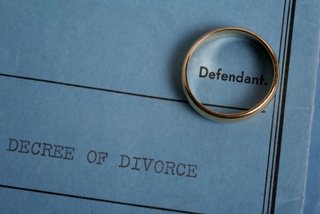 Yes, your spouse is the one who used the credit cards. Yes, your spouse got the house in the divorce. Yes, you each kept your own cars and you’ve both been making the payments.
Yes, your spouse is the one who used the credit cards. Yes, your spouse got the house in the divorce. Yes, you each kept your own cars and you’ve both been making the payments.
His / her finances have nothing to do with you and haven’t for a long time. Right?
Wrong. Not unless your divorce included closing all your joint accounts and opening new ones in your individual names. Just because your divorce decree said that one spouse was responsible for this debt and the other spouse responsible for that one, as far as your creditors are concerned you’re both responsible.
Why? Because they can. If you both signed the application forms for credit cards, you’re both on the contract and you’re both liable.
Therefore, if your spouse has suddenly stopped making those payments, the black mark will show up on your credit report, and the creditors will come looking for you to make the payments.
To be removed from a joint account, you need to cancel the account. Not a good thing for your credit scores, but necessary if you really want to sever that tie. I suggest doing it immediately after a divorce rather than waiting until there’s a problem. Remember, you’re liable for all charges on the account as long as you remain a joint account holder.
You say you didn’t sign the application – your spouse had that credit card when you married and you were just added as an authorized user after the marriage. In that case, you won’t be liable for the debt, but the default will still show up on your credit card.
For several years FICO stopped factoring authorized user status into credit scores. Since becoming an authorized user on an account was helping people raise their scores, some crafty entrepreneurs began selling such use. When FICO realized what was happening, they put a halt to it.
But now they believe they’ve figured out how to filter out any bogus users and they once again factor it in. That’s wonderful if you’re a youth trying to piggyback your parent’s good credit to build your own – not so wonderful if your X-spouse is not paying his or her bills.
The owner of the account can contact the credit card issuer and ask to have an X-spouse removed as an authorized user. If he or she refuses, you can file a “not mine” dispute with the credit bureaus. Remember that it will take them at least 30 days to act, so if you need to do this, get started.
Then there’s your home mortgage. As with credit cards, the mortgage holder is not going to let you off the hook just because it was awarded to your spouse in the divorce decree and you haven’t lived there for 6 years. They won’t even care if you’re not on title – as long as you’re on the contract.
Some believe that signing a quit claim deed to the spouse absolves them of responsibility – but it just isn’t so. If your spouse lets that house go into foreclosure, your credit score will be equally harmed.
If you’re divorced, play it safe. Order your free credit report today and find out if your X-spouse’s activities are still being reported on your credit file. Do it now, before you need credit and find that “you” are not a good credit risk.
CreditScoreQuick.com your resource for free credit reports, credit cards, loans, and ground breaking credit news
Labels: car dealerships




